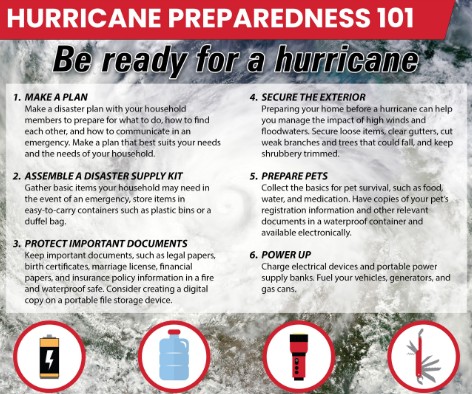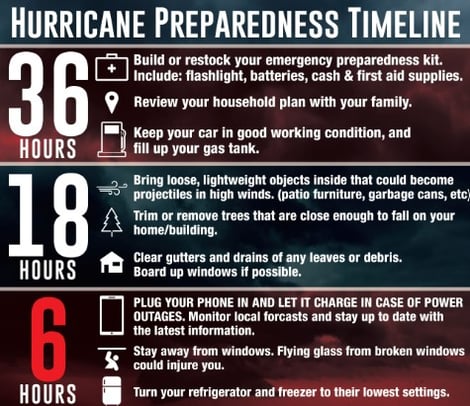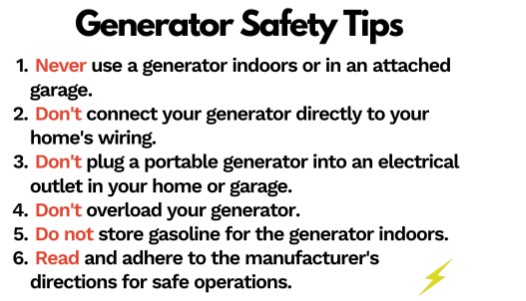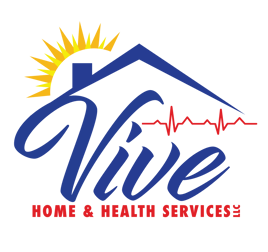Hurricane Preparedness




BEFORE A HURRICANE
Make an emergency plan
Develop a plan with your household members that outlines what to do, how to find each other, and how to communicate if a hurricane strikes.
If someone in your household receives medical treatment or home health care services, work with medical providers to determine how to maintain care and services during times of a disaster.
Create an emergency kit
Have a 3 day supply of emergency items for each person in your household.
Include water, non-perishable food, medication, cash, disinfectant supplies, personal hygiene items, personal identification and important documents, supplies for your children, and pet supplies in your kit.
Prepare your property
Trim or remove damaged trees and limbs.
Secure loose items and clear gutters.
Fuel your vehicles, generators, and gas cans. Consider purchasing a portable generator and additional gas cans.
Check your insurance coverage to ensure adequate coverage. Note that flood and wind damage is not typically covered in a basic homeowner's policy, so consider additional coverage. Keep a copy or your insurance documents with you - paper or electronic.
Use a buddy system
Check on your family, friends, and neighbors to ensure everyone is prepared before a hurricane. Help each other prepare - stocking up on needed items, securing outdoor items, etc.
Communicate with your neighbors to plan how the neighborhood can work together before, during, and after a disaster. Know what special skills your neighbors might have and how they can best be utilized in an emergency.


DURING A HURRICANE
Stay informed
Ensure every household member has access to multiple methods of receiving emergency alerts such as, enabling Wireless Emergency Alerts (WEA) on your mobile phones .
Monitor your local weather radio and TV stations for the latest forecasts.
Follow the directions of local emergency management, visit your local municipality website for the latest emergency information in your city regarding sand locations, road closures, shelter locations, and other emergency resources.
Use a buddy system to
Locate your Disaster Supply Kit.
Avoid using the phone, except for serious emergencies.
Check in with family/friends so they know your location and that you are safe.


AFTER A HURRICANE
Listen to authorities for information and special instructions.
Coastal residents with flooded homes and electrical outages after a hurricane should use extra caution.
Dangers like high water, downed electrical power lines, and broken gas mains are major safety threats after hurricanes.
When conditions allow, Texans are encouraged to check on senior or disabled neighbors and help if possible.
It may take longer than usual to restore power and water if they are out. Report power outages and downed power lines to your local provider.
Take steps to prevent carbon monoxide poisoning if you use a generator.
Be careful during clean-up. Wear protective clothing and work with someone else.
Do not touch electrical equipment if it is wet or if you are standing in water. If it is safe to do so, turn off electricity at the main breaker or fuse box to prevent electric shock.
Avoid wading in flood water, which can contain dangerous debris. Underground or downed power lines can also electrically charge the water.
Save phone calls for emergencies. Phone systems are often down or busy after a disaster. Use text messages or social media to communicate with family and friends.
Document any property damage with photographs. Contact your insurance company for assistance.
Continue to use preventive actions to stay healthy, like washing your hands and wearing a face covering, during clean-up or when returning home.
Evacuate under the following conditions:
If local authorities direct you to do so. Be sure to follow their instructions.
If you live in a mobile home or temporary structure. Such shelters are particularly hazardous during hurricanes no matter how well fastened to the ground.
If you live in a high-rise building. Hurricane winds are stronger at higher elevations.
If you live on the coast, on a floodplain, near a river, or on an inland waterway.
If you feel you are in danger.
If you are unable to evacuate:
Stay indoors during the hurricane and away from windows and glass doors.
Close all interior doors. Secure and brace external doors.
Keep curtains and blinds closed. Calm winds do not indicate the end of the storm. As the eye of the storm passes over, winds will become still and then reverse as the back side of the hurricane moves over the area.
Remain calm.
General Safety and Returning Home
Wait for official word from state or local officials before returning home.
Don’t let anyone re-enter your home while flooded unless the main electrical switch has been turned off. Report electrical hazards to authorities.
Don’t allow children to play in or near flood water or storm drains.
Try to rest and conserve energy to avoid heat-related illness.
Never touch downed power lines or any objects that are in contact with them, including water. Downed power lines are a serious electrocution hazard.
Beware of unstable trees and limbs. Falling tree limbs are a major cause of injury and death following hurricanes.
Use battery-powered flashlights and lanterns instead of candles if you can.
Return home in daylight for best visibility to be aware of any unsafe power sources, including downed power lines. Do not use lanterns or torches until after the premises are safe from gas leaks.
Wear closed-toe shoes in post-flood areas to reduce the chances of punctures or cuts from nails and other sharp contaminated objects.
People with puncture wounds or cuts exposed to floodwater could be at risk of contracting tetanus. They may need to have a tetanus shot to prevent infection.
Driving After a Hurricane - Turn Around and Don't Drown
Flash flooding is the leading cause of weather-related deaths in Texas. If you encounter a flooded road, Turn Around, Don't Drown.
Never walk, swim, or drive through still or moving floodwaters. The water may be hiding dangers such as debris, tree branches, power lines, or damage to the road. As little as six inches of fast-moving water can cause motorists to lose control of their vehicle, even a pickup truck or SUV.
Water and electric vehicle (EV) batteries do not mix. The water will damage the battery and can lead to a dangerous battery fire. Fire can happen in an instant or occur weeks or months after exposure to salt water.
If you suspect damage to an EV from floodwater, do not attempt to charge or drive the vehicle or store it indoors or near a structure. The recommended distance a damaged EV with a lithium battery should be from other structures is 50 feet.
Contact a towing company and have the damaged EV inspected by a dealer or certified mechanic.
Cleaning Up After a Hurricane
Look out for broken glass and exposed nails when clearing debris. Seek medical attention for any puncture-type injuries.
Wash hands often. This can prevent recontamination.
Wear sturdy shoes or boots, long pants, long sleeves, and gloves.
Disinfect children's toys with a solution of one cup bleach to five gallons of water.
Disinfect all furniture, woodwork, and other household surfaces in homes that have flooded.
Do not mix bleach with products that contain ammonia. This can cause toxic fumes.
Replace porous wallboard (from at least 12 inches above the waterline) that has been flood damaged. This can help prevent allergic reactions and other health problems caused by mold.
Click for Info on hauling hurricane-related debris to the curb. Also check with your local government to find out what is available for you.
Water
Follow “Boil Water Notices” that may be issued by local water utilities or the Texas Commission on Environmental Quality. Do not drink water from unknown sources. People under boil water alerts and those with private wells that may have been contaminated by floodwater should use only bottled, boiled, or treated water until water has been tested and found safe.
Bring water to a rolling boil for at least two minutes. You may disinfect water with chlorine or iodine (instructions found here). You may also use ordinary unscented household bleach. Use one-eighth teaspoon (about eight drops) per gallon of water. Sterilize water containers and drinking utensils. Use one teaspoon of household bleach per gallon of water.
Click for info on what customers with boil water notices should do
Food
Wash hands with soap and disinfected water before eating or handling food, after cleanup work, and after handling floodwater-contaminated items.
Discard any food that has been at room temperature for more than two hours or if it has an unusual odor or color. Thawed food from freezers may be safe for consumption or refreezing if it is still partially frozen. Do not eat food that has been in contact with floodwater.
Babies on formula should be given ready-to-feed formula or powdered formula prepared with bottled drinking water.
Carbon Monoxide
Generators should only be placed outdoors at least 20 feet away from buildings. They should never be used in garages, sheds, homes, or small spaces even with the doors open. Portable generators release carbon monoxide (CO), a gas that can build up to dangerous levels in small spaces, even after the generator has been turned off. Because people are not able to see, taste or smell CO, it can kill you before you are even aware it is in your home.
Leaving the car on in a small space can lead to CO poisoning. For example, running a car inside the garage is dangerous. Even if the garage door is open, you can still be exposed to CO.
Generators can pose an electrocution hazard. They should be kept dry and not used in rain or under wet conditions. Also, generators should be turned off and left to cool down before refueling.
Gasoline-powered tools, camp stoves, and charcoal grills also produce CO. They should never be used indoors.
Wildlife
Standing water after floods is a breeding place for mosquitoes. Drain all standing water. Empty water from outdoor items like old tires, trash cans, and flowerpot bases. Protect yourself with insect repellent and wear long-sleeved shirts and long pants.
Do not handle any wildlife. They are often injured in heavy rains and winds. Seek immediate treatment if bitten or injured by an animal. Beware of displaced pets.
Other Resources and Information
After a hurricane, it’s normal to experience emotional distress. Allow yourself and family members time to grieve. Click here for resources to help you and your family deal with the aftermath of a disaster.
Exceptional home care to transform lives today.
COMMITMENT
INNOVATION
(956) 525-7555
© 2025. VIVE Home and Health Services LLC. All rights reserved.
EXCELLENCE
Call us at:
Fax us at:
(956) 525-7071
